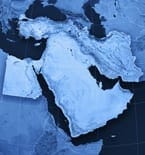By Program

Should I Stay or Should I Go Now? Assessing the Future of U.S. Presence in the Persian Gulf
November 13, 2012 | 12:15:00 | Sid Richardson Hall, Room 3.124

In her presentation for the Strauss Center on November 13, 2012, George Washington University’s Caitlin Talmadge discussed the U.S. military’s current Middle Eastern presence and capabilities and ways to reduce the footprint through what she called a posture of “Residual Forward Presence.”¬ù Looking specifically at maintaining U.S. energy interests in the region, Dr. Talmadge described the current threats to oil as: the closure of the Strait of Hormuz, attacks on oil infrastructure, civil conflict in major oil producing countries, and possible hostile aggression from one country to another. Based on these threats, Dr. Talmadge then outlined four posture assumptions she made when developing her “Residual Forward Presence”¬ù posture: that adversaries’ military capabilities are growing incrementally, that operational speed is key, that a smaller U.S. footprint in the Middle East is better politically, and having a presence is overall a positive.

After detailing current military assets in the region, Dr. Talmadge gave specific recommendations for realigning those assets. For United States Air Force assets, she recommended maintaining intelligence, surveillance, and reconnaissance capabilities, while drawing down the overall size of the force. For U.S. Naval forces, which she called the least controversial in the region due to their light footprint, she recommended repositioning the carrier group outside of the Persian Gulf, while still maintaining forward deployment of smaller craft in the Gulf. Dr. Talmadge recommended stationing a “brigade minus”¬ù Army presence in the region, while still maintaining the “lily pad”¬ù effect of having bases in the region.

The implications of the “Residual Forward Presence,”¬ù according to Dr. Talmadge,”¬ù would be a substantially better positioned and politically helpful force at a negligible reduction in capacity or effectiveness.

Caitlin Talmadge is Assistant Professor of Political Science and International Affairs at the George Washington University. She regularly publishes and lectures to American and international audiences on civil-military relations, U.S. military operations and strategy, nuclear proliferation, and Persian Gulf security issues. Her book U.S. Defense Politics (with Harvey Sapolsky and Eugene Gholz) is assigned widely at American universities and war colleges, with a second edition forthcoming in 2013. Her other writings have appeared in The Washington Quarterly, International Security, The Non-Proliferation Review, The Christian Science Monitor, Foreign Policy.com, and the Harvard International Review. Her current book project, Explaining Military Effectiveness, explores the sources of fighting power on the modern battlefield, with a particular focus on the armies of authoritarian regimes. Other ongoing projects examine the future of U.S. presence in the Middle East, and the relationship between interstate war and coups.


